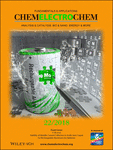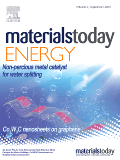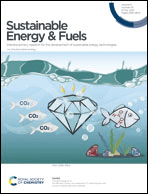
Energy Material Advances
Scope & Guideline
Transforming Ideas into Energy Breakthroughs
Introduction
Aims and Scopes
- Energy Storage Systems:
Research on materials and technologies for various energy storage systems, including lithium-ion, sodium-ion, potassium-ion, and multi-ion batteries, with a focus on improving performance, efficiency, and safety. - Thermoelectric Materials:
Development and characterization of thermoelectric materials and devices, including composites and nanostructures, aimed at efficient energy conversion and harvesting. - Electrochemical Devices:
Investigation of electrochemical devices such as fuel cells and redox flow batteries, emphasizing the design of electrodes, electrolytes, and catalysts to enhance performance and longevity. - Nanostructured Materials:
Synthesis and application of nanostructured materials, including MXenes, carbon nanotubes, and metal-organic frameworks, for improved energy storage and conversion capabilities. - Sustainable Energy Solutions:
Exploration of environmentally friendly materials and processes for energy applications, focusing on reducing the environmental impact of energy technologies.
Trending and Emerging
- Advanced Battery Chemistries:
An increase in research on multivalent-ion and sodium-ion batteries, showcasing a growing interest in alternatives to lithium-ion technology for energy storage solutions. - Flexible and Lightweight Materials:
A notable trend towards the development of flexible and lightweight energy materials, particularly in thermoelectric applications, which are critical for wearable technology and portable energy solutions. - Solid-State Electrolytes:
Emerging focus on solid-state electrolytes for batteries, emphasizing safety and efficiency improvements while addressing challenges related to dendrite formation and ionic conductivity. - Composite Materials for Enhanced Performance:
Growing interest in the design and application of composite materials, particularly those integrating nanostructures and polymers, to achieve improved electrochemical performance and stability. - Environmental Sustainability and Recycling:
A rising emphasis on sustainable practices, including the recycling of energy materials and the development of eco-friendly processes, reflecting a broader commitment to environmental stewardship in energy technology.
Declining or Waning
- Traditional Lithium-Ion Technologies:
As newer battery technologies such as sodium-ion and potassium-ion batteries gain traction, traditional lithium-ion battery research is experiencing a decline in focus, suggesting a shift toward exploring alternative chemistries. - Conventional Thermoelectric Materials:
Research on traditional thermoelectric materials is becoming less frequent as novel materials and composites with enhanced performance characteristics are prioritized. - Basic Electrochemical Mechanisms:
Investigations centered solely on fundamental electrochemical mechanisms without application to advanced materials or devices are diminishing, as the field moves towards more applied research with practical implications.
Similar Journals

Energy Materials
Innovating Materials for a Greener Tomorrow.Energy Materials is a pioneering journal published by OAE PUBLISHING INC, dedicated to the dynamic field of energy materials science and engineering. With a focus on advancing knowledge related to materials used in various energy applications such as batteries, fuel cells, and solar cells, this open-access journal aims to disseminate cutting-edge research and innovative methodologies to a global audience. By offering a platform for original research, reviews, and case studies, Energy Materials plays a crucial role in bridging the gap between materials science and energy technology, facilitating the development of sustainable energy solutions. Researchers, professionals, and students alike will find invaluable insights in its pages, fostering advancements in this essential sector. To explore the latest developments in energy materials, visit Energy Materials at OAE PUBLISHING INC.

Journal of the Japan Institute of Energy
Exploring the Frontiers of Energy Technology.Journal of the Japan Institute of Energy, ISSN 0916-8753, is a reputable academic journal dedicated to the field of energy studies, reflecting the dynamic and evolving landscape of energy research. Published by the Japan Institute of Energy, the journal serves as a platform for disseminating innovative research, technologies, and methodologies related to energy engineering, renewable energy sources, and sustainability practices. While this journal does not currently offer open access, it remains a vital resource for professionals, researchers, and students alike, particularly those focused on advancing knowledge within Energy Engineering and Power Technology, Fuel Technology, and related areas. As of 2023, it is ranked in the Q4 quartile across several categories in Scopus, which highlights its foundational role in fostering scholarly discourse, despite its lower ranking in the competitive global landscape. Established in 1990 and continuously evolving, the journal provides insights into the challenges and innovations in the energy sector, making it an essential read for anyone invested in the future of energy solutions.

ChemElectroChem
Advancing the frontiers of catalysis and electrochemistry.ChemElectroChem is a premier open-access journal published by WILEY-V C H VERLAG GMBH, focusing on the interdisciplinary fields of catalysis and electrochemistry. Established in 2014 and actively publishing until 2024, this journal boasts an impressive reputation, currently ranked in the Q2 category for both catalysis and electrochemistry according to the 2023 metrics. With an Scopus ranking placing it in the 74th percentile for Electrochemistry and 61st for Chemical Engineering and Catalysis, ChemElectroChem serves as an essential platform for researchers, professionals, and students dedicated to advancing knowledge and fostering innovation in these critical scientific domains. Since its transition to open access in 2023, the journal aims to maximize the dissemination of cutting-edge research and facilitate the exchange of ideas among global scholars, thereby enhancing the accessibility and impact of high-quality science within the community. For those engaged in the ever-evolving conversations around energy storage, conversion processes, and sustainable solutions, ChemElectroChem is an invaluable resource.

RUSSIAN JOURNAL OF ELECTROCHEMISTRY
Fostering Knowledge in the Dynamic World of ElectrochemistryThe Russian Journal of Electrochemistry, published by Pleiades Publishing Inc, is a reputable scientific resource that caters to the dynamic field of electrochemistry. Since its inception in 1996, this journal has become a platform for the dissemination of cutting-edge research, exploring both foundational studies and innovative applications within electrochemical science. Despite currently holding a Q4 categorization in its field, the journal is dedicated to enhancing its scholarly impact and visibility, reflecting its commitment to fostering advancements in electrochemical technologies. With its ISSN 1023-1935 and E-ISSN 1608-3342, the journal strives to reach a global audience of researchers, professionals, and students alike. Though the journal is not open access, its contents are crucial for anyone looking to stay at the forefront of electrochemical research and developments. The journal's editorial board includes well-respected experts, ensuring that published articles contribute significantly to the scientific community and pave the way for future innovations in the field.

Materials Today Energy
Advancing Sustainable Solutions for Tomorrow's Energy NeedsMaterials Today Energy is a premier journal published by Elsevier, focusing on the interdisciplinary field of energy materials. With an ISSN of 2468-6069, the journal is renowned for its impactful research as evidenced by its impressive Q1 quartile rankings in multiple categories including Energy Engineering and Power Technology, Fuel Technology, and Renewable Energy. It stands out with strong Scopus rankings, highlighting its significance in the respective research communities, such as being ranked 3rd in Nuclear Energy and Engineering. Established from 2016 to 2024, the journal aims to provide a platform for innovative research that addresses the global demands for sustainable energy solutions. Although it is not open access, Materials Today Energy is accessible to a broad audience, encouraging collaborations among researchers, professionals, and students in the pursuit of advancing materials science and energy technologies. This makes it an essential resource for those looking to remain at the forefront of discoveries that shape the future of energy.

eScience
Unlocking the Future of Materials and Renewable EnergyeScience, published by KEAI PUBLISHING LTD, is an innovative open-access journal that has rapidly established itself as a leading platform in the fields of Electrochemistry, Materials Chemistry, and Renewable Energy, Sustainability, and the Environment. Since its inception in 2021, eScience has garnered recognition for its high-quality research, achieving an impressive Q1 ranking in each of its primary categories as of 2023. With a remarkable Scopus ranking—placing it among the top percentile of journals in these disciplines—eScience serves as an essential resource for researchers and practitioners aiming to advance knowledge and application in sustainable practices and materials innovation. As an open-access journal, eScience supports widespread dissemination of vital research, ensuring accessibility for all, which is critical in addressing contemporary global challenges. The journal's commitment to fostering interdisciplinary dialogue and collaboration positions it as a cornerstone for those dedicated to pushing the boundaries of scientific discovery.

Journal of Power Sources Advances
Transforming Energy Systems Through Cutting-edge ScienceJournal of Power Sources Advances, published by ELSEVIER, stands at the forefront of innovative research within the fields of Electrochemistry, Energy Engineering and Power Technology, and Materials Chemistry. Having established itself as an Open Access journal since 2020, it aims to disseminate knowledge rapidly and widely among researchers, professionals, and students interested in the latest advancements in power sources technology. With an impressive impact factor and recognition as a Q1 journal in 2023 across multiple categories, it addresses key challenges and innovations in energy generation, storage, and materials development. The journal's commitment to high-quality, peer-reviewed content fosters a vibrant community for discussing breakthroughs that hold the potential to transform energy systems globally. The journal operates out of the Netherlands, enhancing its global outreach, while its strong Scopus rankings highlight its influential role in driving research within its scope. Journal of Power Sources Advances is the pivotal resource for those dedicated to shaping the future of energy sustainability and technology.

Energy & Environmental Materials
Transforming Research into Real-World ImpactEnergy & Environmental Materials, published by WILEY, is an esteemed academic journal dedicated to pioneering research in the multifaceted domains of energy, environmental science, and materials science. Since its inception in 2018, this journal has rapidly established itself as a leading platform, holding a prestigious Q1 ranking across multiple categories including Renewable Energy, Sustainability, and Waste Management, reflecting its significant contributions to advancing knowledge in these critical areas. With a robust Scopus ranking that positions it in the top percentile for Environmental Science and Materials Science, it caters to a diverse audience of researchers, professionals, and students seeking cutting-edge findings and practical applications in energy efficiency and sustainable materials. This open-access journal facilitates the dissemination of innovative research and aims to bridge the gap between scientific exploration and real-world solutions for a sustainable future. The editorial team encourages submissions that explore both theoretical and practical aspects, ensuring that every publication not only contributes to the academic landscape but also drives impactful change in energy and environmental practices.

Sustainable Energy & Fuels
Shaping Tomorrow's Energy Landscape TodaySustainable Energy & Fuels is a leading journal published by the Royal Society of Chemistry, dedicated to advancing knowledge in the fields of energy engineering, fuel technology, and renewable energy solutions. With its ISSN of 2398-4902 and notable Q1 status in both Energy Engineering and Power Technology as well as Fuel Technology, this journal ranks impressively in the Scopus database, ensuring a strong platform for disseminating impactful research. The journal spans a comprehensive scope aimed at addressing the global challenges of sustainable energy, including innovative methodologies and technologies that promote environmental sustainability. Although it operates under a traditional access model, the journal is committed to providing high-quality content that engages researchers, professionals, and students alike. With significant contributions expected through 2024, Sustainable Energy & Fuels stands at the forefront of facilitating scholarly communication, inspiring advancements in energy technologies that align with sustainability goals.

Electrochemical Energy Reviews
Advancing Sustainable Solutions Through ElectrochemistryElectrochemical Energy Reviews, published by SpringerNature, serves as an essential platform for the dissemination of cutting-edge research in the fields of electrochemistry, material science, and energy engineering. With an impressive impact factor and ranked in the Q1 category across multiple disciplines including Chemical Engineering and Energy Technology, this journal highlights its commitment to advancing knowledge and innovation within the energy sector. Operating since 2018, the journal not only provides a valuable resource for researchers and professionals but also invites contributions from students and emerging scholars interested in the pivotal role of electrochemical processes in sustainable energy solutions. Published in Germany and widely accessible to the global research community, Electrochemical Energy Reviews is an indispensable reference for those keen on exploring the future of energy technologies.